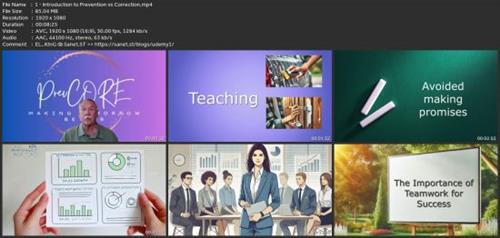- Thread Starter
- #1
Prevcore, Prevention Vs. Correction

What you'll learn
Understand Correction vs. Prevention: Learn the differences between reactive correction and proactive prevention for sustainable improvement/problem reduction
Effective Leadership for Change: Understand leadership's role in shifting to prevention-focused culture and inspiring teams to embrace proactive practices
Use Key Problem-Solving Tools: Gain skills like Pareto analysis and Fishbone diagrams to identify root causes and prioritize preventive actions effectively
Manage Organizational Silos for Improvement: Learn to manage silos, fostering cross-department collaboration and a holistic approach for long-term success
Develop & Track KPIs: Create KPIs to monitor preventive efforts, track progress, and measure the success of continuous improvement initiatives
Vendor-Customer Relationships: Apply vendor-customer dynamics within and outside the organization to set clear expectations and enhance accountability
SMART Goals for Prevention: Set Specific, Measurable, Achievable, Relevant, Time-bound goals to guide preventive efforts in line with organizational strategies
Requirements
This course is designed to be accessible to everyone, with no prerequisites or prior experience required, as you will learn everything you need to know All essential concepts, tools, and strategies will be introduced from the ground up, so learners can feel confident in developing a proactive, prevention-focused mindset. All that's required is a willingness to explore new ideas and a commitment to applying preventive practices for long-term success.
Description
In a world that often focuses on quick fixes, this course shifts the spotlight toward a proactive approach: prevention. PrevCORE: Prevention vs. Correction delves into the powerful impact of addressing issues at the root before they demand urgent corrections. Whether you're navigating personal challenges, managing a team, or leading an organization, mastering this proactive mindset is key to long-term success and resilience.Throughout this course, you'll learn the principles of prevention, how it compares to correction, and why both are essential. You'll explore real-life case studies, gain practical tools for evaluating when to prevent vs. when to correct, and understand the cost-benefit analysis behind proactive planning.What You'll Learn:- The core differences between prevention and correction and change from a mindset of dealing with what's important vs. what's urgent- Key strategies for implementing preventive measures in everyday life and professional settings- The role of goal-setting, risk assessment, and future planning in a prevention mindset- Tools and techniques to shift from a reactive to a proactive approach in various scenariosJoin this journey to explore how choosing prevention can lead to better, more sustainable outcomes. You'll leave empowered to 'make tomorrow better,' with actionable insights and a fresh perspective on approaching challenges before they arise.
Overview
Section 1: Foundational Concepts of Prevention vs. Correction
Lecture 1 Introduction to Prevention vs Correction
Lecture 2 Introduction to a Simple Methodology
Lecture 3 The Importance of Holism and Silos in Shifting to a Proactive Prevention Culture
Lecture 4 Correction, Prevention: Understanding the Fluidity of Problem-Solving Approaches
Section 2: Leadership and Culture Building for Prevention
Lecture 5 Putting the Leader in Leadership
Lecture 6 The Leader as a Change Agent: Understanding and Leveraging Team Personalities
Lecture 7 Mastering Goal Setting: Shaping Tomorrow with Prevention vs. Correction
Lecture 8 Focus on Prevention: Shifting from Reactive Correction to Proactive Solutions
Section 3: Analytical Tools and Techniques for Problem Solving
Lecture 9 Understanding Pareto Analysis for Effective Preventive Action
Lecture 10 The Importance of KPIs and Trend Analysis in Monitoring Your Top 3 Problems
Lecture 11 The Power of the Fishbone Diagram in Root Cause Analysis
Lecture 12 Understanding Flowcharting for Process Improvement and Prevention
Section 4: Application and Integration of Prevention Strategies
Lecture 13 The Vendor-Customer Relationship-Bridging Gaps to Improve Process and Prevention
Lecture 14 Focus on Prevention: Shifting from Reactive Correction to Proactive Solutions
Lecture 15 Bringing It All Together-From Correction to Prevention
This course is designed for leaders, managers, and decision-makers across various industries who are responsible for improving processes, reducing inefficiencies, and driving organizational success. The course is particularly beneficial for individuals in operations, quality management, administration, and strategic planning roles. While the examples are focused on healthcare for consistency, the principles and tools can be applied to a wide range of industries, including: Healthcare administration Manufacturing Finance and banking Retail and supply chain management Technology and IT services Hospitality and customer service industries The course is suitable for professionals looking to improve their leadership skills, foster a culture of prevention, and create more resilient, efficient organizations.

Say "Thank You"
rapidgator.net:
k2s.cc:

Published 11/2024
MP4 | Video: h264, 1920x1080 | Audio: AAC, 44.1 KHz
Language: English | Size: 4.25 GB | Duration: 2h 46m
Making Tomorrow Better
MP4 | Video: h264, 1920x1080 | Audio: AAC, 44.1 KHz
Language: English | Size: 4.25 GB | Duration: 2h 46m
Making Tomorrow Better
What you'll learn
Understand Correction vs. Prevention: Learn the differences between reactive correction and proactive prevention for sustainable improvement/problem reduction
Effective Leadership for Change: Understand leadership's role in shifting to prevention-focused culture and inspiring teams to embrace proactive practices
Use Key Problem-Solving Tools: Gain skills like Pareto analysis and Fishbone diagrams to identify root causes and prioritize preventive actions effectively
Manage Organizational Silos for Improvement: Learn to manage silos, fostering cross-department collaboration and a holistic approach for long-term success
Develop & Track KPIs: Create KPIs to monitor preventive efforts, track progress, and measure the success of continuous improvement initiatives
Vendor-Customer Relationships: Apply vendor-customer dynamics within and outside the organization to set clear expectations and enhance accountability
SMART Goals for Prevention: Set Specific, Measurable, Achievable, Relevant, Time-bound goals to guide preventive efforts in line with organizational strategies
Requirements
This course is designed to be accessible to everyone, with no prerequisites or prior experience required, as you will learn everything you need to know All essential concepts, tools, and strategies will be introduced from the ground up, so learners can feel confident in developing a proactive, prevention-focused mindset. All that's required is a willingness to explore new ideas and a commitment to applying preventive practices for long-term success.
Description
In a world that often focuses on quick fixes, this course shifts the spotlight toward a proactive approach: prevention. PrevCORE: Prevention vs. Correction delves into the powerful impact of addressing issues at the root before they demand urgent corrections. Whether you're navigating personal challenges, managing a team, or leading an organization, mastering this proactive mindset is key to long-term success and resilience.Throughout this course, you'll learn the principles of prevention, how it compares to correction, and why both are essential. You'll explore real-life case studies, gain practical tools for evaluating when to prevent vs. when to correct, and understand the cost-benefit analysis behind proactive planning.What You'll Learn:- The core differences between prevention and correction and change from a mindset of dealing with what's important vs. what's urgent- Key strategies for implementing preventive measures in everyday life and professional settings- The role of goal-setting, risk assessment, and future planning in a prevention mindset- Tools and techniques to shift from a reactive to a proactive approach in various scenariosJoin this journey to explore how choosing prevention can lead to better, more sustainable outcomes. You'll leave empowered to 'make tomorrow better,' with actionable insights and a fresh perspective on approaching challenges before they arise.
Overview
Section 1: Foundational Concepts of Prevention vs. Correction
Lecture 1 Introduction to Prevention vs Correction
Lecture 2 Introduction to a Simple Methodology
Lecture 3 The Importance of Holism and Silos in Shifting to a Proactive Prevention Culture
Lecture 4 Correction, Prevention: Understanding the Fluidity of Problem-Solving Approaches
Section 2: Leadership and Culture Building for Prevention
Lecture 5 Putting the Leader in Leadership
Lecture 6 The Leader as a Change Agent: Understanding and Leveraging Team Personalities
Lecture 7 Mastering Goal Setting: Shaping Tomorrow with Prevention vs. Correction
Lecture 8 Focus on Prevention: Shifting from Reactive Correction to Proactive Solutions
Section 3: Analytical Tools and Techniques for Problem Solving
Lecture 9 Understanding Pareto Analysis for Effective Preventive Action
Lecture 10 The Importance of KPIs and Trend Analysis in Monitoring Your Top 3 Problems
Lecture 11 The Power of the Fishbone Diagram in Root Cause Analysis
Lecture 12 Understanding Flowcharting for Process Improvement and Prevention
Section 4: Application and Integration of Prevention Strategies
Lecture 13 The Vendor-Customer Relationship-Bridging Gaps to Improve Process and Prevention
Lecture 14 Focus on Prevention: Shifting from Reactive Correction to Proactive Solutions
Lecture 15 Bringing It All Together-From Correction to Prevention
This course is designed for leaders, managers, and decision-makers across various industries who are responsible for improving processes, reducing inefficiencies, and driving organizational success. The course is particularly beneficial for individuals in operations, quality management, administration, and strategic planning roles. While the examples are focused on healthcare for consistency, the principles and tools can be applied to a wide range of industries, including: Healthcare administration Manufacturing Finance and banking Retail and supply chain management Technology and IT services Hospitality and customer service industries The course is suitable for professionals looking to improve their leadership skills, foster a culture of prevention, and create more resilient, efficient organizations.
Screenshots

Say "Thank You"
rapidgator.net:
You must reply in thread to view hidden text.
k2s.cc:
You must reply in thread to view hidden text.
